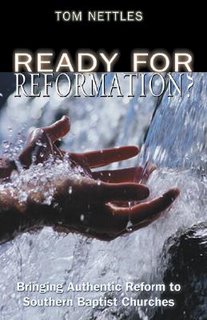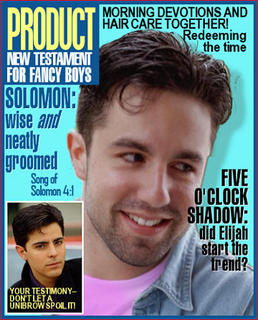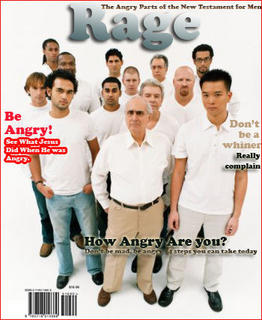As follow-up on yesterday's post, I just want to share some of my thoughts on this. Given that I have had over a week to think about this, many things have run through my head, and because there has been very little addressing the matter, one is left to some degree of speculation. Some of my thoughts are just that - speculations; however, others I think are founded and grounded and (I think) should be pointed out. Here's my take:
1. The Southern Baptist Theological Seminary (SBTS) has historically been known for its doctrinal distinctives, of which is explicitly Reformed. For example, take the school's Abstract Of Principles (1858) on election (Article V):
"Election is God's eternal choice of some persons unto everlasting life--not because of foreseen merit in them, but of His mere mercy in Christ--in consequence of which choice they are called, justified, and glorified."
Secondly, let's take the Baptist Faith and Message (2000) on regeneration (Article IV.A) and election (Article IX):
"Regeneration, or the new birth, is a work of God's grace whereby believers become new creatures in Christ Jesus. It is a change of heart wrought by the Holy Spirit through conviction of sin, to which the sinner responds in repentance toward God and faith in the Lord Jesus Christ. Repentance and faith are inseparable experiences of grace."
"Election is the gracious purpose of God, according to which he regenerates, sanctifies and saves sinners. It is perfectly consistent with the free agency of man, and comprehends all the means in connection with the end. It is a most glorious display of God's sovereign goodness, and is infinitely wise, holy, and unchangeable. It excludes boasting and promotes humility. It encourages the use of means in the highest degree."
Now I could also mention the New Hampshire Baptist Confession of 1833 or the Westminster Confession of 1647 but that would appear extraneous and redundant. The point is that what Graham believes is neither consonant with the Baptist tradition or Southern's tradition in particular. While it is true that there have been many chapel speakers who have come from other denominations who believe otherwise (i.e. Ligon Duncan and paedobaptism), they come outside the SBC denomination and disclose themselves as such.
Graham, on the other hand, has spoken out against the core tenets and foundational beliefs of our school, and nothing is said about it, which leads me to my second point.
2. Once I arrived here at Southern, I suffered through an 8-hour Cooperative Program Class Lecture. One of the chief points made was loyalty to the Southern Baptist Convention. Later that week, I heard Dr. Mohler speak in chapel and emphasized how we are a confessional seminary, as professors went up on stage to sign the Abstract of Principles. Now if we are to be loyal and confessional, should we not hold true to those convictions? I mean, we are quick to lay out our convictions and positions on other matters, especially with those who are on the extreme left. But with a fellow conservative are we to just give him a microphone and ignore what he has previously said? That mentality appears to undermine the very emphasis placed upon this school as being loyal, confessional, and faithful to the Baptist tradition. I confess that we must confess not just in ceremony but in all our conversation (way of life).
3. I believe that it is precisely because of Southern's distinctiveness, academic excellence, theological framework, inspiring leadership, and unparalleled faculty that enrollment has skyrocketed. It is no secret that our school is one of the premier seminaries in the world and that our theological stance is biblical, reformed, and conservative. Yet, for those of us who have come to this school for this reason find it immensely frustrating when it appears that we are ashamed for who we are and don't want anyone to know that we are Reformed for fear of retaliation or being dubbed as "hyper-Calvinist". Those labels are nothing but stigmatization and scare tactics made to drive people away, yet I find it ironic that the very nature of this school, which draws people away, is pulling in more students than ever. Go figure.
4. Southern made a public forum out of the issue of alcohol, which has received a lot of attention both in the press and especially on blogs. The schools stance is that if you drink alcohol or are found doing so, you are no longer a student at Southern (kicked out). Fair enough. But what about people believing and teaching stuff contrary to what the school believes? We are to show grace. In one situation law is shown (alcohol), and in the other grace is shown (Arminians). Now where they line up in Mohler's theological triage is up for debate, but there is a real point to be made here. This inconsistency/duplicity seems to delegitimize or at least bring to suspicion the motivation and enforcement of the rules at Southern. We accept contrary thinking but oust contrary behaving. Is there a difference? I mean, what you believe and what you do - is there a difference? As one once said, "I believe, therefore I do." And what one believes has immediate implication on what one does. Graham believed in his stance and acted on it, and those actions are indicative of his beliefs. Are his beliefs wrong? I will leave that for you to decide, but what should be desired is consistency. If the lesser (in my opinion alcohol use) is implicitly derived and is enforced, then should it not be the same for the greater (doctrine of salvation) which is explicit and ingrained in Scripture?
5. I believe it is right to say that as a student I represent the school and am accountable to it. However, I also believe that in the same manner the reciprocal value is that the school also represents the student(s). I think the little man should have a voice, and if appropriately and sincerely presented, his/her viewpoints should be considered as legitimate. I would speculate to say that there are faculty members and students alike who would speak out and be more vocal about their take on this matter but possibly are afraid to do so for fear of institutional disciplinary action. When there are no ad homonym attacks, character maligning, or immature name calling, then intelligent conversation and dialogue should not only be accepted but considered as a valuable piece of information for future decision-making. The student should have representation and a voice, and it should not be muzzled, muted, or censored.
6. The lack of clarity and forthrightness from the administration concerning chapel speakers and how/why they are chosen has led some to speculation. Because I work third shift, I sleep in the mornings and am not able to attend chapel. However, those who I have talked to who do go express concern for the purpose of it. Is it a public relations venue for speakers? A political party favor for close friends? Or is it for the students, community edification, and corporate worship? While I cannot make first-hand assertions, others can and have. Furthermore, for teachings so contrary to this institution, there must be a significant reason as to why Graham was invited to come, and the context begs inquiry and deserves explanation.
7. Another contemplation I have had is whether the silent shift away from Reformed doctrinal emphasis is a way to appear more "mainstream" among conservative Baptists and to not be the catalyst for undue division in the convention. Possibly one may think the pendulum swung too far and too extreme after the liberals left and Mohler stood strong in the 90's. Now that the theological fight is over (in a sense), there is a reversal to a more balanced and open-minded perspective. Along with the false accusations of teaching "hyper-Calvinism", one might see why Southern welcomes chapel speakers and other theologians who are not of the Reformed tradition. After all, they are still our brothers (and sisters) in Christ. But being silent or passive about what we were once open and vocal about makes one wonder about the place of priority, transparency, and disclosure. We are who we are in good times and in bad. Our beliefs don't change or are emphasized only when forced to. We emphasize them everyday in the way we live. Where the 90's was the "upgrade" controversy at Southern, could the dawn of the 21st century be the "downgrade" controversy? I know that sounds like a stretch, and I hope it is, but how we define ourselves will determine whether controversy is better than compromise.
8. It would be perfectly clear and consistent if Graham came to Southern under the auspice of a public forum or special lecture stating why he does not believe what we believe. We do this all the time (special lectures). However, not addressing his statements and giving him wholesale endorsement and a microphone in an act of deference is in my opinion dishonest and disingenuous. Were Dave Hunt or Paul Owen or the like were to advocate their views or freewill theism, then it would be quite clear what their reception would be. Yet in Graham's case, because he is more intimately associated with the school and favorably viewed upon (which I am sure he is a great guy), then we gloss over the matter. "Faithful are the wounds of a friend, but deceitful are the kisses of an enemy." Right?
9. I am wondering what the fallout is on all that has transpired in recent years with the incessant attacks against the doctrines of grace by prominent SBC leaders. Often I hear of pastors, church leaders, and members who are booted because of their belief in Reformed theology. They are considered as false teachers or heretics in some circles, and the Brother Bubba who has Graham's and Hunt's autograph in his Bible will look to their example and be inspired to do the same. There is no telling of the harm brought upon the kingdom of God because of ignorance and poor stewardship of "the mysteries of God" which have led some to fire their pastor because of being fired up by their preacher heroes. If there is any offense and division, it is not from the Reformed side. Time and time again, we have listened and appealed to Scripture, wanting to have transparency and a seat at the table, but this is not allowed. From the local church to the national convention, there seems to be a systematic and calculated attempt to eradicate the resurgence of Reformed theology among Southern Baptists. The younger generation who hope to be good Bereans are not persuaded by inflated opinions, dogmatism, or emotional appeal. We want the truth, whether it be from a fired-up and excited expository preacher or the mouth of Balaam's ass.
10. Finally, let me conclude with something positive. I love Southern Seminary. I love our leadership and the direction our school is going. I love where God has me. And whether you believe it or not, I love Jack Graham. Yet my love cannot be blind. What I see and hear and believe, I share. I am not one for political or theological correctness. My thoughts and actions are hard to smooth over and edit. To simply say what others want to hear or compromise for the sake of appeasement is cowardice and undermining the treasure house of truth. As one dean once told me, "Tim, what you will find in ministry is not so much how to do something, but how not to do something." That has, in my case, proven to be true. I hope it is not so here. I am not ashamed of who I am or of what I believe, and I am not ashamed of my school and what it stands for. If I am wrong or singing in minor key, let it be because of the chords which have been struck from Another, and my wrongness be repented of with honesty and humility. I do believe that what you confess and believe affects everything you do. And everyone is called to do theology, not just academia or the elites. Doing theology passionately and principally has be the pursuit of my life, even at this moment. And in doing theology, sometimes times you are right and sometimes you are wrong. I have seen in my pilgrimage many times where I have been wrong in my theology and how it affected and shaped reality and my worldview. And this might just be the case to show the practicality of doing theology rightly and the importance of seminaries themselves, in that showing oneself approved, he need not be ashamed, but rightly dividing the word of truth, he will not divide the church but show it for what it is - the "pillar and buttress of truth" (1 Timothy 3:15).
 Sadly enough, this great day goes in the calendar of Christian History as probably the most under-appreciated day by contemporary Christians.
It was 488 years ago when the battlecry of Ad Fontes ("Back to the Sources") was sounded forth by the Reformers.
It was the exclamation point and foundational mark of sola Scriptura. It was the reorientation of the church to the authority of Scripture alone, for the Christian life, and polity of the church.
It was the denunciation of meritorious efficaciousness in the pronunciation of sola gratia, thereby nullifying any synergistic efforts to accredit salvation to anything but the sheer grace of God which staggers a repentant sinner's heart.
It was the exclusive and definitive affirmation of solo Christo, that it is in Christ alone, and it was through his mediatorial work as Prophet, Priest, and King that we have salvation by his sinless life, substitutionary death, and victorious resurrection.
It was the reassertion of sola fide where the practice of indulgences, sacraments, pilgrimages, and other substitutes were shown to be fallacious and the solid ground of justification by faith alone anchored the Christian truth about salvation.
And it was the end-all of every act, thought, and deed to be soli deo gloria whereas all boasting and exultation should be in God alone. Truly, "let him who boasts, boast in the Lord," and let him who glories, glory in the cross. For by Him and to Him and for Him are all things - our Glorious One.
Sadly enough, this great day goes in the calendar of Christian History as probably the most under-appreciated day by contemporary Christians.
It was 488 years ago when the battlecry of Ad Fontes ("Back to the Sources") was sounded forth by the Reformers.
It was the exclamation point and foundational mark of sola Scriptura. It was the reorientation of the church to the authority of Scripture alone, for the Christian life, and polity of the church.
It was the denunciation of meritorious efficaciousness in the pronunciation of sola gratia, thereby nullifying any synergistic efforts to accredit salvation to anything but the sheer grace of God which staggers a repentant sinner's heart.
It was the exclusive and definitive affirmation of solo Christo, that it is in Christ alone, and it was through his mediatorial work as Prophet, Priest, and King that we have salvation by his sinless life, substitutionary death, and victorious resurrection.
It was the reassertion of sola fide where the practice of indulgences, sacraments, pilgrimages, and other substitutes were shown to be fallacious and the solid ground of justification by faith alone anchored the Christian truth about salvation.
And it was the end-all of every act, thought, and deed to be soli deo gloria whereas all boasting and exultation should be in God alone. Truly, "let him who boasts, boast in the Lord," and let him who glories, glory in the cross. For by Him and to Him and for Him are all things - our Glorious One.
 We cannot underestimate or underappreciate the significance of this day in history. The nailing of the 95 Theses on Wittenburg Door by Martin Luther on October 31, 1517 should be not only observed but celebrated by every confessing evangelical with a heart of gratitude and great joy. And in that celebration, we must also be mindful that we are ever reforming, and together, friends, we must always be crying out in days of decline and degradation, Ad Fontes! Ad Fontes! Ad Fontes! Let us always be reforming, even now, for Christ's sake, for the gospel's sake, and for the sake of the kingdom of God. Our God truly is a mighty fortress, so let us have our conscience held captive to the Word of God and speak with humble articulation, bold pronunciation, and faithful exposition to the truth which has "once and for all been handed down to the saints." May this generation rise in the reformation spirit to not only remember Luther but follow in his tread.
We cannot underestimate or underappreciate the significance of this day in history. The nailing of the 95 Theses on Wittenburg Door by Martin Luther on October 31, 1517 should be not only observed but celebrated by every confessing evangelical with a heart of gratitude and great joy. And in that celebration, we must also be mindful that we are ever reforming, and together, friends, we must always be crying out in days of decline and degradation, Ad Fontes! Ad Fontes! Ad Fontes! Let us always be reforming, even now, for Christ's sake, for the gospel's sake, and for the sake of the kingdom of God. Our God truly is a mighty fortress, so let us have our conscience held captive to the Word of God and speak with humble articulation, bold pronunciation, and faithful exposition to the truth which has "once and for all been handed down to the saints." May this generation rise in the reformation spirit to not only remember Luther but follow in his tread.


































